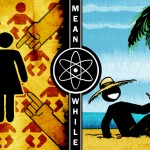Each Friday in Not Fit for Dinner, C. Ryan Knight explores political issues and the preconceptions guiding our understanding of and responses to them.
Rather than devote my column this week to a top political headline, I want to touch on the importance of being careful and critical consumers of news and media, particularly in the age of YouTube, sound-bytes, blogging, etc. This topic seems timely to me, considering the presidential election campaign is in full swing, and misguided reporting can have serious consequences.
The idea came when I read a questionable piece by Benny Johnson at The Blaze on linguist and activist Noam Chomsky’s controversial remarks about Europe and austerity. After three brief paragraphs introducing who Chomsky is and summarizing what he said in an interview, Johnson offered an edited version of the video, available here.
Johnson then pulled select quotes from the video and emboldened what he considered key phrases from Chomsky’s interview. It seems Johnson did so to lead his readers to dismiss Chomsky’s statements. Judging by the comments on Johnson’s article, the tactic seemed to work. One commenter, for instance, responded, “The guy [Chomsky] is a citified ignoramus.”
There are significant problems with Johnson’s coverage of Chomsky’s interview. The video The Blaze offers is only two minutes, whereas what Chomsky said about the global financial crisis runs for roughly twelve minutes, which you can watch below (the segment starts around 13:25 and ends around 25:27):
The numerous examples and sources Chomsky gave to support his main claims were the first thing to disappear from The Blaze‘s edited video. Perhaps the editing was done for concision, but it could also have been done to make Chomsky sound like a deranged geriatric off his rocker. I suspect the latter goal.
Some of the quotes Johnson pulls from Chomsky’s interview were out of context as a result of the video’s editing. In one quote (the fourth), Chomsky was speaking from someone else’s perspective, not his own. In the final quote, Johnson didn’t clarify to what Chomsky was referring: the monograph “Failure by Design” by the Economic Policy Institute, which Chomsky was summarizing. By quoting Chomsky without the context of his sources, Johnson thus leads his readers to think Chomsky is simply making stuff up, which is inaccurate.
Misleading reporting (like Johnson’s) calls into question the legitimacy of reporters. And it’s no surprise that it happens all too often (and has been for quite some time). (For another current example, see Alan Noble’s criticism of conservative coverage of Arabfest.)
Here, then, are basic steps one can take to carefully consume news and media, and to avoid being misled:
- Find trusted sources for news and media—and still double-check what those sources report. Make sure the reporter has accurately established the context for what’s reported.
- If a source like a speech, video, study, or document is referenced, look up and read the referenced work yourself. For example, don’t read summaries of a State of the Union address. Read the address itself. If you come across an edited version of a source, look for the full-length version instead.
- Be cautious when you encounter inflammatory language. The more polemical and aggressive an author’s tone, the less credible that author tends to be.
- Pay attention to breaking news, but wait to form your view on the issue until more information has come out and the situation has developed further.
- Review and be on the lookout for logical fallacies when reading and listening to news.
I realize looking deeper into the news is challenging, time-consuming, and oftentimes downright boring. I kept distracting myself last week while reading through the current immigration law while researching my column on immigration and Mitt Romney. A Department of Defense report I covered in my column on Iran and Stuxnet was shorter than America’s immigration law but by no means was the report as exciting as a Jason Bourne novel.
But careful consumption of news is crucial to do if one wants to be a responsible citizen. For Christians, doing so is also a way to continue their tradition of being “people of the book”—that is, people who go to the source itself rather than take someone else’s word on any given issue. The information age allows people wanting to be well-informed to find quality information if they are willing to put in the time, search a little longer, and read primary sources.











